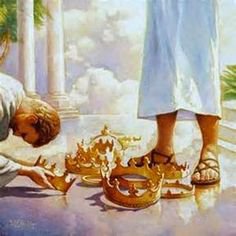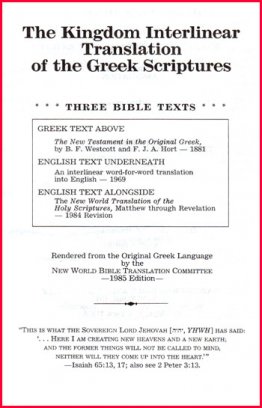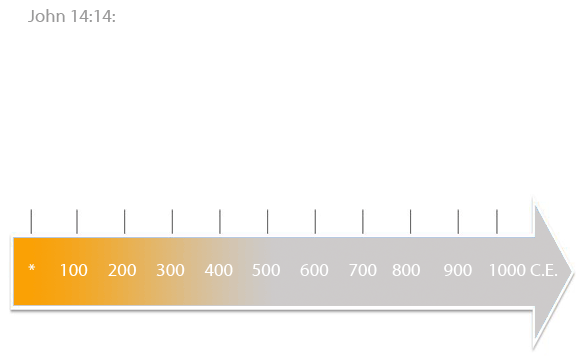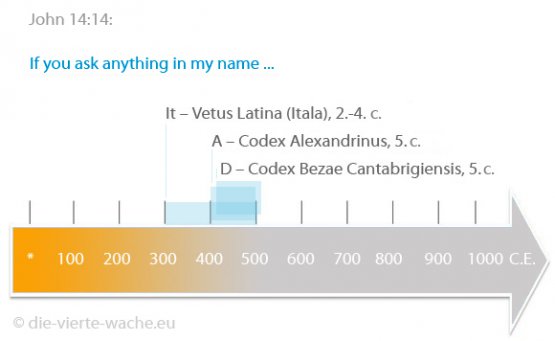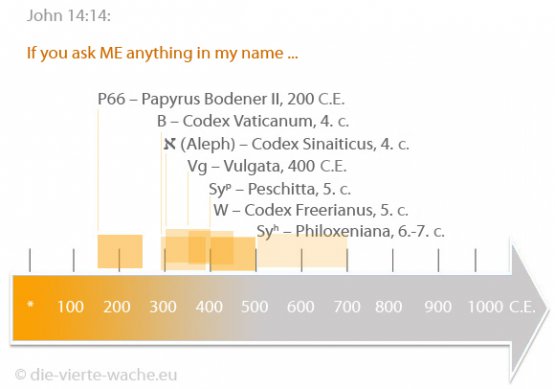3- Are We Allowed to Pray to Jesus?
We read in Hebrews chapter 1 verse 6:
"But when he again brings his Firstborn into the inhabited earth, he says: “And let all of God’s angels do obeisance to him."
The Greek word translated as "do obeisance" is proskynēsatōsan (see article no. 2 in this Jesus series). It is also translated as "honour, do reverence to, worship, prostrate oneself before someone, bow, kneel down".
Question: If the angels who are superior to us "MUST perform an act of worship to Jesus" – how much more then we??
Here is a quotation from the "Insights" book (Bible Dictionary of Jehovah's Witnesses):
"True, Psalm 97, which the apostle evidently quotes at Hebrews 1:6, refers to Jehovah God as the object of the ‘bowing down,’ and still this text was applied [by Apostle Paul, under inspiration !! Our comment] to Christ Jesus. (Ps 97:1, 7) However, the apostle previously had shown that the resurrected Christ is “the reflection of [God’s] glory and the exact representation of his very being.” (Heb 1:1-3) Hence, if what we understand as “worship” is apparently directed to the Son by angels, it is in reality being directed through him to Jehovah God, the Sovereign Ruler, “the One who made the heaven and the earth and sea and fountains of waters.” (Re 14:7; 4:10, 11; 7:11, 12; 11:16, 17; compare 1Ch 29:20; Re 5:13, 14; 21:22.)"
it-2 pp. 523-524 Obeisance
Yes, that's it!
But is that a reason to REFUSE Jesus the apparently offered and apparently justified "worship" (why "worship" in inverted commas at all?)?!
There is more evidence that speaks FOR worshipping Jesus, namely that which the "faithful and discrete slave" himself has cited here!
An often quoted biblical passage is Revelation 4:10,11. It reads:



"... the 24 elders fall down before the One seated on the throne and worship the One who lives forever and ever, and they cast their crowns before the throne, saying: 11 “You are worthy, Jehovah our God, to receive the glory and the honor and the power, because you created all things, and because of your will they came into existence and were created.”
Jehovah is clearly worshipped here.
But for comparison, read Revelation 5:13,14:



"And I heard every creature in heaven and on earth and underneath the earth and on the sea, and all the things in them, saying: “To the One sitting on the throne and to the Lamb be the blessing and the honor and the glory and the might forever and ever.” 14 The four living creatures were saying: “Amen!” and the elders fell down and worshipped."
No doubt: Here God's holy, inspired Word describes how both Jehovah and the Lamb, Jesus, are worshipped and adored by all creatures!
Revelation 5:12 even contains a hymn of praise from all heavenly creatures exclusively and specifically for the Lamb, Yahusha (Jesus), our Saviour:



"And I saw, and I heard a voice of many angels around the throne and the living creatures and the elders, and the number of them was myriads of myriads and thousands of thousands, and they were saying with a loud voice: “The Lamb who was slaughtered is worthy to receive the power and riches and wisdom and strength and honor and glory and blessing.“ " (Revelation 5:11,12)
Did Jesus ever encourage people to worship him?
When Jesus was on earth, when He brought Jehovah closer to the people and had not yet paid the ransom, He always gave glory to Jehovah as the Most High.
He always encouraged his disciples and other listeners to turn to his Father in prayer - to ask in Jesus' name, but to address the Father.
Always ?
Please compare
-
John 14:13,14 with
-
John 15:16 and
- John 16:23.
And then please read the same verse John 14:14 in the Greek Interlinear Translation of the Watchtower Society (see figure below).
Do you notice anything?
The Greek word "µε" = "me" is missing in the English translation on the right.
An oversight? No. In the footnote of the Online Study Bible the omission was somewhat cryptically justified:
"According to ADIt and in accordance with 15:16 and 16:23;
P66אBWVgSyh,p: „If you ask me anything ...“."
This means:
Seven old Bible manuscripts contained the version "If you ask me", three Bible manuscripts did not.
We have arranged the bible manuscripts on a timeline. First for the text version without "me", then for the texts in which Christ said: "If you ask me anything ..." :
Once again for comparison:
How would you decide as a Bible translator?
The majority of the manuscripts are right ...?
Or the manuscripts that fit better into my concept?
In any case, it is questionable when translators modify one verse to bring it "in line" with two other verses (John 15:16 and 16:23) without taking into account that it WAS BEFORE in line with the biblical context (Hebrews 1:6, Revelation 5:13,14, Psalm 2:12 and another 20 or so references to "proskyneo" in the Christian Greek scriptures).
If Paul was inspired by the Holy Spirit to write,



"... that in the name of Jesus every knee should bend—of those in heaven and those on earth and those under the ground— and every tongue should openly acknowledge that Jesus Christ is Lord to the glory of God the Father." (Philippians 2:10, 11)
— why, then, the obvious RELUCTANCE of the leading Jehovah's Witnesses to acknowledge him in this elevated position and actually "bend their knee before him" ?! (Which is clearly not meant as a gymnastic exercise but as a gesture of worship.)
It may be related to the fact that Jesus' nature was not fully understood. The following articles in the Jesus series deal with this.
The next article is:
"4- Is Jesus the Archangel Michael?"




